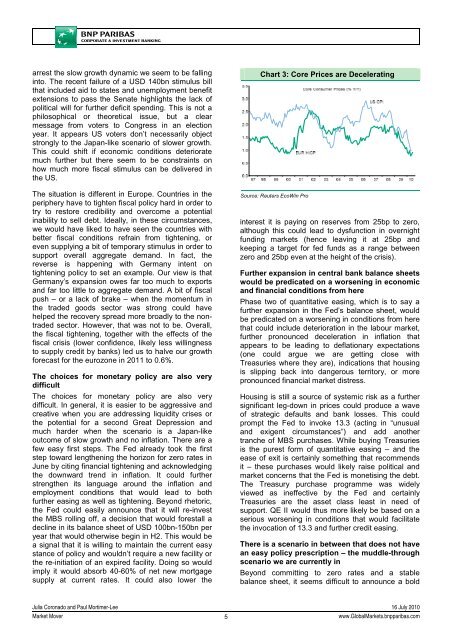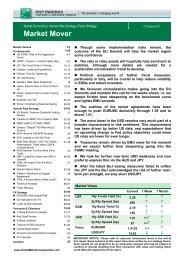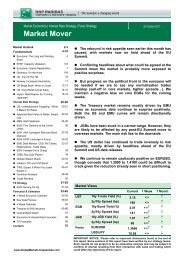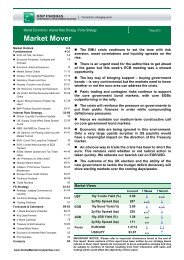Market Economics | Interest Rate Strategy - BNP PARIBAS ...
Market Economics | Interest Rate Strategy - BNP PARIBAS ...
Market Economics | Interest Rate Strategy - BNP PARIBAS ...
Create successful ePaper yourself
Turn your PDF publications into a flip-book with our unique Google optimized e-Paper software.
arrest the slow growth dynamic we seem to be falling<br />
into. The recent failure of a USD 140bn stimulus bill<br />
that included aid to states and unemployment benefit<br />
extensions to pass the Senate highlights the lack of<br />
political will for further deficit spending. This is not a<br />
philosophical or theoretical issue, but a clear<br />
message from voters to Congress in an election<br />
year. It appears US voters don’t necessarily object<br />
strongly to the Japan-like scenario of slower growth.<br />
This could shift if economic conditions deteriorate<br />
much further but there seem to be constraints on<br />
how much more fiscal stimulus can be delivered in<br />
the US.<br />
The situation is different in Europe. Countries in the<br />
periphery have to tighten fiscal policy hard in order to<br />
try to restore credibility and overcome a potential<br />
inability to sell debt. Ideally, in these circumstances,<br />
we would have liked to have seen the countries with<br />
better fiscal conditions refrain from tightening, or<br />
even supplying a bit of temporary stimulus in order to<br />
support overall aggregate demand. In fact, the<br />
reverse is happening with Germany intent on<br />
tightening policy to set an example. Our view is that<br />
Germany’s expansion owes far too much to exports<br />
and far too little to aggregate demand. A bit of fiscal<br />
push – or a lack of brake – when the momentum in<br />
the traded goods sector was strong could have<br />
helped the recovery spread more broadly to the nontraded<br />
sector. However, that was not to be. Overall,<br />
the fiscal tightening, together with the effects of the<br />
fiscal crisis (lower confidence, likely less willingness<br />
to supply credit by banks) led us to halve our growth<br />
forecast for the eurozone in 2011 to 0.6%.<br />
The choices for monetary policy are also very<br />
difficult<br />
The choices for monetary policy are also very<br />
difficult. In general, it is easier to be aggressive and<br />
creative when you are addressing liquidity crises or<br />
the potential for a second Great Depression and<br />
much harder when the scenario is a Japan-like<br />
outcome of slow growth and no inflation. There are a<br />
few easy first steps. The Fed already took the first<br />
step toward lengthening the horizon for zero rates in<br />
June by citing financial tightening and acknowledging<br />
the downward trend in inflation. It could further<br />
strengthen its language around the inflation and<br />
employment conditions that would lead to both<br />
further easing as well as tightening. Beyond rhetoric,<br />
the Fed could easily announce that it will re-invest<br />
the MBS rolling off, a decision that would forestall a<br />
decline in its balance sheet of USD 100bn-150bn per<br />
year that would otherwise begin in H2. This would be<br />
a signal that it is willing to maintain the current easy<br />
stance of policy and wouldn’t require a new facility or<br />
the re-initiation of an expired facility. Doing so would<br />
imply it would absorb 40-60% of net new mortgage<br />
supply at current rates. It could also lower the<br />
Chart 3: Core Prices are Decelerating<br />
Source: Reuters EcoWin Pro<br />
interest it is paying on reserves from 25bp to zero,<br />
although this could lead to dysfunction in overnight<br />
funding markets (hence leaving it at 25bp and<br />
keeping a target for fed funds as a range between<br />
zero and 25bp even at the height of the crisis).<br />
Further expansion in central bank balance sheets<br />
would be predicated on a worsening in economic<br />
and financial conditions from here<br />
Phase two of quantitative easing, which is to say a<br />
further expansion in the Fed’s balance sheet, would<br />
be predicated on a worsening in conditions from here<br />
that could include deterioration in the labour market,<br />
further pronounced deceleration in inflation that<br />
appears to be leading to deflationary expectations<br />
(one could argue we are getting close with<br />
Treasuries where they are), indications that housing<br />
is slipping back into dangerous territory, or more<br />
pronounced financial market distress.<br />
Housing is still a source of systemic risk as a further<br />
significant leg-down in prices could produce a wave<br />
of strategic defaults and bank losses. This could<br />
prompt the Fed to invoke 13.3 (acting in “unusual<br />
and exigent circumstances”) and add another<br />
tranche of MBS purchases. While buying Treasuries<br />
is the purest form of quantitative easing – and the<br />
ease of exit is certainly something that recommends<br />
it – these purchases would likely raise political and<br />
market concerns that the Fed is monetising the debt.<br />
The Treasury purchase programme was widely<br />
viewed as ineffective by the Fed and certainly<br />
Treasuries are the asset class least in need of<br />
support. QE II would thus more likely be based on a<br />
serious worsening in conditions that would facilitate<br />
the invocation of 13.3 and further credit easing.<br />
There is a scenario in between that does not have<br />
an easy policy prescription – the muddle-through<br />
scenario we are currently in<br />
Beyond committing to zero rates and a stable<br />
balance sheet, it seems difficult to announce a bold<br />
Julia Coronado and Paul Mortimer-Lee 16 July 2010<br />
<strong>Market</strong> Mover<br />
5<br />
www.Global<strong>Market</strong>s.bnpparibas.com
















